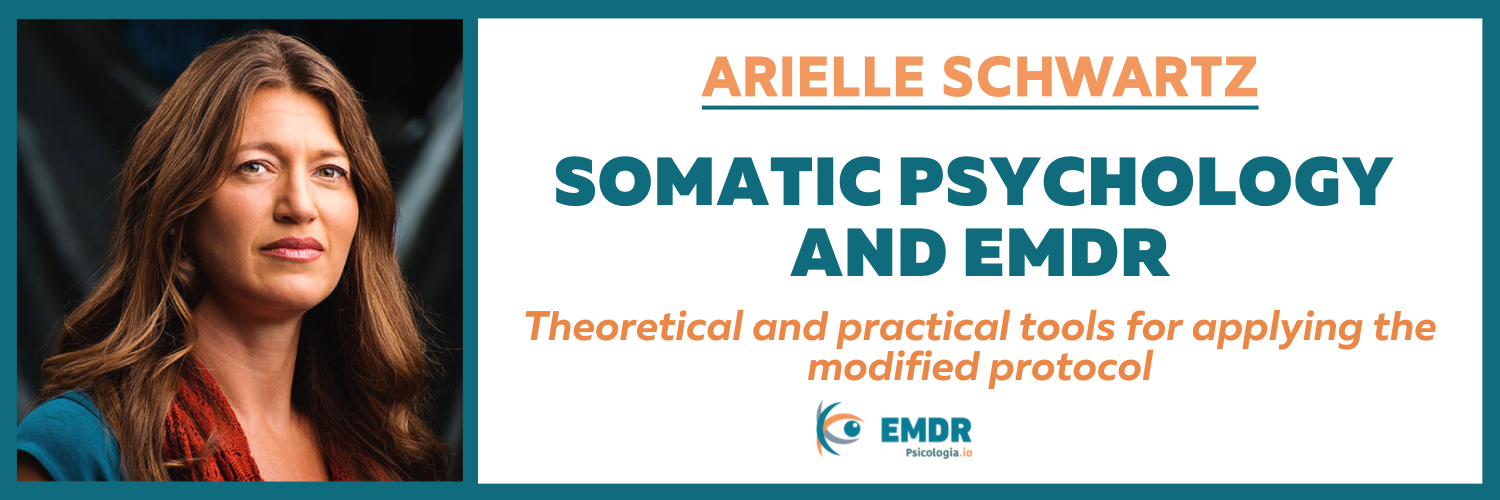
Somatic psychology and EMDR. Theoretical and practical tools for applying the modified protocol
THE COURSE IS AVAILABLE IN ENGLISH AND TURKISH LANGUAGE
With Arielle Schwartz
In this experiential course, dr. Arielle Schwartz presents the theoretical and practical tools for applying the EMDR protocol in the field of psychosomatics.
When patients repress emotions, they can also manifest somatically. Traditional therapeutic approaches deal with the cognitive and emotional aspects, while the somatic experience is often left out of the therapy room. Talking therapy may have limited effectiveness for patients with somatisation symptoms, developmental trauma, dissociative defences or debilitating feelings of shame. It is therefore important for therapists to become proficient in working with patients' non-verbal communications and somatic manifestations.
Somatic psychology brings attention to the body by highlighting physiological characteristics and their influence on human behaviour. In this course, the history of somatic psychology and the fundamental principles behind this work will be described. Interventions are drawn from a wide range of somatic psychotherapy modalities, including integrated body psychotherapy, the Hakomi method, mind-body psychotherapy, authentic movement, formative psychology, focusing, the movement cycle, somatic experience and sensorimotor psychotherapy. The basic principles that constitute a unified approach to somatic psychology as a treatment for trauma will be presented.
Emphasis will also be given to the science of embodiment -that is, embodied experience in the body- and why psychosomatics is important in helping patients work with the dysregulated and aroused states that characterise PTSD. Specific treatment considerations will be brought in to enable clinicians to address the patient's preverbal memories of trauma, dissociation and somatisation symptoms. Finally, there will be a focus on somatic self-care approaches for therapists dealing with traumatisation and burnout.
OBJECTIVES
- Describing at least three principles that are part of the unified approach to somatic psychology.
- Recognising how polyvagal theory provides an essential basis for understanding arousal states in relation to trauma reprocessing.
- Identifying how somatic countertransference deepens our understanding of the therapist/client relationship.
- Using the practical tools of mind-body therapy to help clients feel equipped and prepared for trauma processing.
- Describing how to help patients build tolerance to affect and feelings in preparation for trauma processing.
- Recognising how working within the 'window of tolerance' can help reducing the likelihood of re-traumatisation.
- Describing how 'top-down' and 'bottom-up' interventions can speed up or slow down the pace of trauma processing.
- Identifying how in-body holding patterns can block processing in the desensitisation phase of EMDR therapy.
- Practicing at least three interventions for working with somatic symptoms in trauma treatment.
- Understanding how to work with preverbal memories by paying attention to somatic sensations.
- Applying modified protocols for dissociation in EMDR therapy.
In this experiential course, dr. Arielle Schwartz presents the theoretical and practical tools for applying the EMDR protocol in the field of psychosomatics.
When patients repress emotions, they can also manifest somatically. Traditional therapeutic approaches deal with the cognitive and emotional aspects, while the somatic experience is often left out of the therapy room. Talking therapy may have limited effectiveness for patients with somatisation symptoms, developmental trauma, dissociative defences or debilitating feelings of shame. It is therefore important for therapists to become proficient in working with patients' non-verbal communications and somatic manifestations.
Somatic psychology brings attention to the body by highlighting physiological characteristics and their influence on human behaviour. In this course, the history of somatic psychology and the fundamental principles behind this work will be described. Interventions are drawn from a wide range of somatic psychotherapy modalities, including integrated body psychotherapy, the Hakomi method, mind-body psychotherapy, authentic movement, formative psychology, focusing, the movement cycle, somatic experience and sensorimotor psychotherapy. The basic principles that constitute a unified approach to somatic psychology as a treatment for trauma will be presented.
Emphasis will also be given to the science of embodiment -that is, embodied experience in the body- and why psychosomatics is important in helping patients work with the dysregulated and aroused states that characterise PTSD. Specific treatment considerations will be brought in to enable clinicians to address the patient's preverbal memories of trauma, dissociation and somatisation symptoms. Finally, there will be a focus on somatic self-care approaches for therapists dealing with traumatisation and burnout.

- Recordings available for 12 months from purchase
- All materials are downloadable